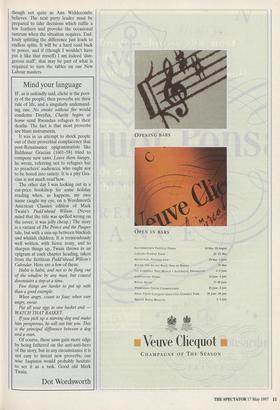Mind your language
IF, as is unkindly said, cliché is the poet- ry of the people, then proverbs are their rule of life, and a singularly undemand- ing one. No smoke without fire would condemn Dreyfus, Charity begins at home send Rwandan refugees to their deaths. The fact is that most proverbs are blunt instruments.
It was in an attempt to shock people out of their proverbial complacency that post-Renaissance epigrammatists like Balthasar Gracian (1601-58) tried to compose new saws. Leave them hungry, he wrote, referring not to refugees but to preachers' audiences, who ought not to be bored into satiety. It is a pity Gra- cian is not much read 'now.
The other day I was looking out in a cut-price bookshop for some holiday reading when, as happens, my own name caught my eye, on a Wordsworth American Classics edition of Mark Twain's Pudd'nhead Wilson. (Never mind that the title was spelled wrong on the cover; it was jolly cheap.) The story is a variant of The Prince and the Pauper tale, but with a mix-up between blackish and whitish children. It is tremendously well written, with fierce irony, and to sharpen things up, Twain throws in an epigram at each chapter heading, taken from the fictitious Pudd'nhead Wilson's Calendar. Here are a few of them: Habit is habit, and not to be flung out of the window by any man, but coaxed downstairs a step at a time.
Few things are harder to put up with than a good example.
When angry, count to four; when very angry, swear.
Put all your eggs in one basket and WATCH THAT BASKET If you pick up a starving dog and make him prosperous, he will not bite you. This is the principal difference between a dog and a man.
Of course, these saws gain more edge by being fathered on the anti-anti-hero of the story, but in any circumstance it is not easy to invent new proverbs; our wise Jaspistos would probably hesitate to set it as a task. Good old Mark Twain.


































































 Previous page
Previous page